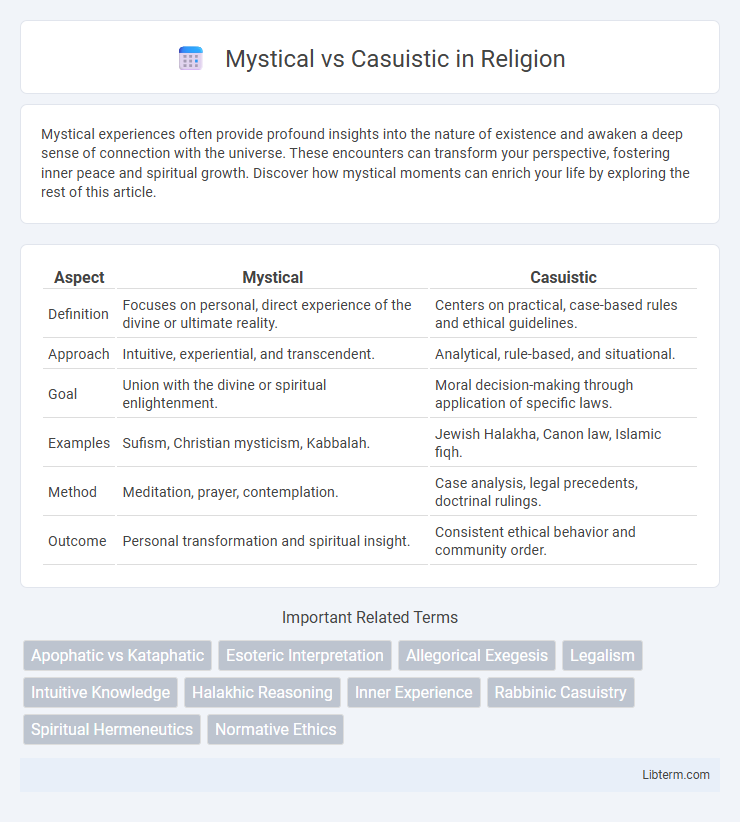Mystical experiences often provide profound insights into the nature of existence and awaken a deep sense of connection with the universe. These encounters can transform your perspective, fostering inner peace and spiritual growth. Discover how mystical moments can enrich your life by exploring the rest of this article.
Table of Comparison
| Aspect | Mystical | Casuistic |
|---|---|---|
| Definition | Focuses on personal, direct experience of the divine or ultimate reality. | Centers on practical, case-based rules and ethical guidelines. |
| Approach | Intuitive, experiential, and transcendent. | Analytical, rule-based, and situational. |
| Goal | Union with the divine or spiritual enlightenment. | Moral decision-making through application of specific laws. |
| Examples | Sufism, Christian mysticism, Kabbalah. | Jewish Halakha, Canon law, Islamic fiqh. |
| Method | Meditation, prayer, contemplation. | Case analysis, legal precedents, doctrinal rulings. |
| Outcome | Personal transformation and spiritual insight. | Consistent ethical behavior and community order. |
Defining Mystical and Casuistic Approaches
Mystical approaches emphasize the direct, intuitive experience of transcendent realities beyond rational understanding, often rooted in personal spiritual insight and transcendence. Casuistic approaches prioritize systematic analysis of specific cases or moral dilemmas, applying established principles to resolve ethical or legal questions methodically. Both approaches offer distinct methods for navigating complex spiritual and ethical issues, with mysticism focusing on experiential knowledge and casuistry on practical reasoning.
Historical Origins and Development
Mystical traditions trace their origins to ancient religious experiences emphasizing direct, personal union with the divine, often rooted in early spiritual movements like Neoplatonism and Eastern mysticism. Casuistic methods developed primarily within medieval Jewish, Christian, and Islamic legal frameworks, focusing on practical case-based ethical reasoning and jurisprudence. Both evolved through centuries of scholarly interpretation, with mysticism influencing contemplative practices and casuistry shaping moral decision-making doctrines.
Key Philosophical Differences
Mystical philosophy emphasizes direct experiential knowledge and the unity of the individual soul with a transcendent reality, often through meditation or revelation, prioritizing spiritual insight over rational analysis. Casuistic philosophy, rooted in practical reasoning, focuses on case-by-case ethical decision-making and the application of general moral principles to specific situations, emphasizing logic and juridical processes. The key difference lies in mysticism's pursuit of holistic, intuitive understanding versus casuistry's structured, analytical approach to resolving moral dilemmas.
Core Characteristics of Mystical Thought
Mystical thought centers on direct, intuitive experiences of ultimate reality, emphasizing unity, transcendence, and inner transformation. It often involves symbolic language and practices like meditation or contemplation to access deeper spiritual truths beyond rational understanding. Mysticism values personal insight and the dissolution of the ego as core pathways to achieving spiritual enlightenment.
Essence of Casuistic Reasoning
Casuistic reasoning centers on applying general moral principles to specific cases through detailed analysis, emphasizing practical judgment over abstract theorizing. It systematically addresses ethical dilemmas by considering context and nuances, enabling flexible decision-making that adapts to real-world complexities. This approach contrasts with mystical reasoning, which relies on intuition or transcendental insights rather than structured evaluative processes grounded in precedent and consequence.
Mystical Traditions Across Cultures
Mystical traditions across cultures emphasize direct, personal experiences of the divine or ultimate reality, often through meditation, contemplation, or trance states. These traditions, found in Sufi Islam, Christian mysticism, Hindu Vedanta, and Buddhist Zen, prioritize inner transformation and unity with the sacred over formalized legal codes. The universal themes of mysticism include transcendence, spiritual awakening, and the dissolution of ego boundaries, contrasting with the rule-based, interpretive framework of casuistic traditions.
Casuistry in Legal and Ethical Contexts
Casuistic reasoning plays a crucial role in legal and ethical contexts by analyzing specific cases to resolve complex moral dilemmas with practical solutions. It relies on precedent and detailed examination of individual circumstances rather than abstract principles, enhancing decision-making in law and ethics. This method allows for flexible interpretation and adaptation of rules to achieve just outcomes tailored to particular situations.
Interplay Between Mysticism and Casuistry
The interplay between mysticism and casuistry reveals a dynamic tension where mystical experiences emphasize direct, intuitive knowledge of the divine, while casuistry focuses on practical ethical decision-making through case analysis. Mysticism's emphasis on transcendent states often challenges the rigid frameworks of casuistic reasoning, prompting a synthesis that enriches moral theology by integrating personal spiritual insight with structured ethical principles. This fusion enhances ethical deliberation in complex moral scenarios by balancing the subjective dimensions of faith with objective normative guidelines.
Criticisms and Controversies
Mystical perspectives often face criticism for their reliance on subjective experiences and lack of empirical evidence, making them vulnerable to accusations of irrationality and unverifiability. Casuistic approaches are challenged for potentially enabling moral relativism due to their case-by-case analysis, which critics argue may lead to inconsistency and exploitation of ethical loopholes. Both frameworks spark controversy by raising debates over the basis of knowledge and the application of ethical principles in diverse contexts.
Contemporary Relevance and Applications
Mystical approaches emphasize intuitive, experiential knowledge, influencing contemporary spiritual practices and holistic therapies that prioritize personal insight and transformation. Casuistic reasoning, rooted in case-based ethical analysis, remains essential in modern legal systems and medical ethics for addressing complex, situational dilemmas with practical solutions. Both frameworks contribute to diverse fields by balancing abstract principles with contextual judgment, enhancing decision-making processes across contemporary disciplines.
Mystical Infographic

 libterm.com
libterm.com